On 18th March 2012, Hazrat Mirza Masroor Ahmad(aba), the Fifth Khalifa of the Ahmadiyya Muslim Jama’at and its worldwide Head, inaugurated the Baitul Ghafoor Mosque in Halesowen, a town in the West Midlands of the United Kingdom.
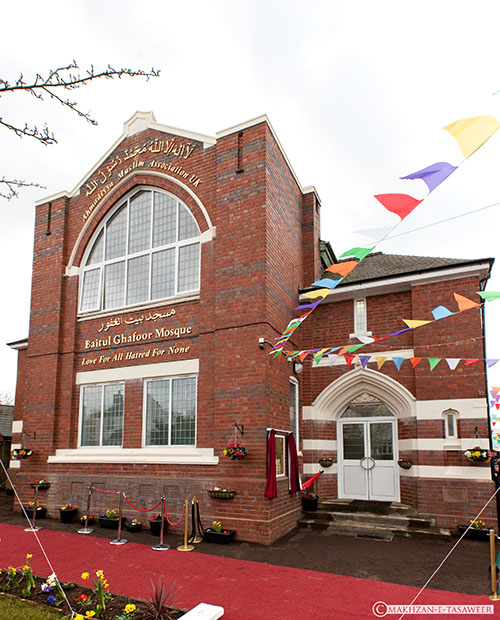
An afternoon reception was then held to mark the opening of the Mosque and was attended by dignitaries and guests from all walks of life.
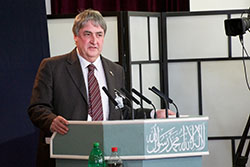
Phil Bennion, MEP for West Midlands, said that it was a true “privilege” to attend the opening of the Mosque and he pledged to always be ready to assist the Ahmadiyya Community in its efforts to promote peace and understanding.
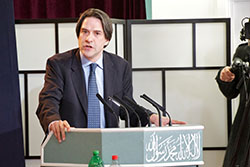
James Morris, MP for Halesowen and Rowely Regis said that it was a “great honour” for him to welcome Hazrat Mirza Masroor Ahmad(aba) to his local constituency.
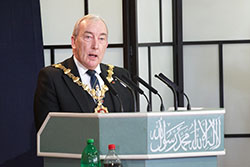
Councillor Michael Evans, Mayor of Dudley Council, praised the Ahmadiyya Muslim Community for raising hundreds of thousands of pounds each year for UK charities.

The keynote address of the afternoon was delivered by Hazrat Mirza Masroor Ahmad(aba), Head of the Ahmadiyya Muslim Community. The transcript of this address is presented here:
After reciting Tashhahud, T’awwudh and Bismillah, Hazrat Khalifatul Masih V(aba) said:
“All the distinguished guests: Assalamo Alaikum Wa Rahmatullahe Wa Barakatohu – peace and blessings of Allah be upon you all.
First of all, I would like to take this opportunity to thank all our distinguished guests, who have spared their time to attend the inauguration of our new mosque here today. In today’s world, we find that people generally do not seem to be interested in religion. This indifference is not specific to any one religion, but is observed across the board. Here in the United Kingdom, if we look at the national statistics, then we find that approximately 75 to 80 per cent of the population still identify themselves with a particular religion. However, in reality barely 9 or 10 per cent of the population, at the very most, regularly attend Church or other places of worship. Thus, whilst there remains a superficial recognition of religion, there is little interest or attention paid to religious practices by the majority of society. Bearing all of this in mind, it is generally the case that those who do attend religious functions or events related to religion in some way, are amongst those who still hold an inherent interest and curiosity about religion or because they themselves are religious people. Or a third reason for attending is simply to display good moral values. Whilst this third reason has no direct relationship with religion itself, however holding good moral standards is, in fact, a fundamental part of religious teachings.
Thus, when a person chooses to attend a religious event hosted by people from a religion different to his own, he is normally motivated out of a desire to learn about the other faith and perhaps also due to a desire to display high moral values. Therefore, keeping in view all of these reasons, we are most certainly grateful to all of you, because today’s event is a purely religious event whereby a place of worship is being inaugurated where people can join together to submit before the One God. A mosque is a place where people are safeguarded and protected from worldly desires or thoughts and so are able to worship God Almighty with sincerity and purity of heart. Thus, your attendance here today is an attempt on your part to discover and learn about the true Islam and this act is proof of your high moral standards. In any case, whatever your motivation for attending, let me say that we are truly grateful and that you are all very welcome.
With these few words of appreciation, I shall now come to the main objectives of my speech, which I am sure will be of interest to many of you. Primarily, I wish to convey to you what exactly our Community – the Ahmadiyya Muslim Jama’at – really is and what its purposes and objectives are. To reveal this, I shall summarise the way in which the Founder of our Community explained all of this. We believe that the Founder of the Ahmadiyya Muslim Community, Hazrat Mirza Ghulam Ahmad(as) of Qadian, is the Promised Messiah and the Imam Mahdi (the Guided One). In accordance with the true teachings of Islam, we believe his advent was foretold in both the Holy Qur’an and also in the prophecies made by the Holy Prophet Muhammad(saw). We further believe that his advent was also foretold in other religious scriptures. Thus, we believe that he came in fulfilment of all of these prophecies at a time when the state of the world was such that there was an urgent need for a Promised Messiah and Reformer to appear. Upon his advent, the Promised Messiah(as) outlined various purposes and objectives for which he had been commissioned by God Almighty. Today, I shall mention and discuss three key objectives which he fulfilled.
The first objective with which the Promised Messiah(as) was tasked was to establish a connection between mankind and its Creator. He taught that the relationship between man and God was to be established through worship and through truly believing in God’s Attributes of being the Best Provider, the Most Mighty and the Possessor of All Powers. The Promised Messiah(as) enjoined us repeatedly to understand this fundamental and guiding principle through which a person can become a true worshipper of the One God. Only through following this guidance can a real and sincere relationship with God Almighty be formed. It is to achieve this key objective that mosques are built. Hence, this is why this mosque of ours is being opened today, as a means to fulfil the rights and responsibilities that we owe to God Almighty.
The second major purpose for which the Promised Messiah(as) was sent was to make the people of the world aware of the need to fulfil the rights of God’s Creation. What he taught was not a new teaching; instead, he came to remind the world of the message that had been brought by all of the previous Prophets of God and which had been revealed in its most perfect and final shape, in the form of the Holy Qur’an, which was revealed by God to the Founder of Islam, the Holy Prophet Muhammad(saw). The third primary objective of the Promised Messiah(as) for which he was sent was to bring to an end to all religious warfare and so lay the foundations for peace and reconciliation to be established throughout the world.

Having just outlined the three key objectives of the Promised Messiah(as), I shall now speak in greater detail about each of them. In terms of the first purpose, that of establishing a relationship between God Almighty and mankind, if we observe we find that a worshipper of God personally benefits from that worship. This is because he who worships and prays to God in a sincere manner is rewarded for his efforts by becoming a recipient of God’s blessings and His bounties. This benefit is not limited to that individual alone, but it also benefits others in society. As a true worshipper exhibits good morals, this in turn has a positive effect on the surrounding society. We find that when worship is performed purely for the sake of attaining God’s pleasure then the worshipper automatically comes to follow the commands of God Almighty. The Holy Qur’an is filled with numerous commands exhorting man to fulfil the rights of others. Indeed, the Holy Qur’an has stated categorically that if on the one hand any person worships God, yet on the other, he deprives others of their due rights then such worship will be completely rejected by God Almighty and it will be devoid of any blessing. Look and see, therefore, just how beautifully the rights of mankind have been established and preserved by Islam.
I come now to speak about the second purpose with which the Promised Messiah(as)was sent. I have just mentioned that a person who discharges the rights owed to God Almighty automatically comes to discharge the rights owed to mankind. However, in order to uphold and manifest the highest human values, it is essential that we identify just what exactly the rights owed to our fellow man are. The Holy Qur’an has identified and listed these very rights, of which I shall now mention just a few. In Chapter 3, Verse 111 of the Holy Qur’an it states that a person can only be deemed a true believer when he calls on others to do good and when he forbids all forms of evil. This is a truly beautiful teaching whereby it is clarified that it is not simply enough to seek or promote peace between individuals, but that a believer must spread goodness and prevent wrongdoing throughout the entire society. The Qur’an also goes on to explain how such virtues and kindness are to be advanced. It teaches that you should not try to compel others through force to be good and to refrain from wrongdoing. Instead, such objectives ought to be pursued through piety and by displaying an excellent manner and attitude at all times.
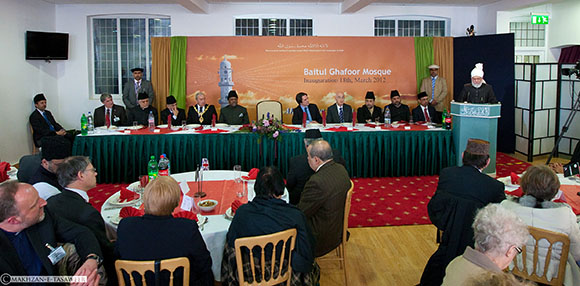
In Chapter 51, Verse 20 of the Holy Qur’an, our attention is drawn towards fulfilling the rights of poor people and those who are suffering from deprivation. Muslims are commanded that if a person in need approaches them for help, then they should not be turned down in a harsh way. This is because when destitute people feel that their deprivation has reached its peak, then it leads to the spread of restlessness and disorder throughout society and so ultimately the peace and tranquillity of the community is shattered. Therefore, helping deprived people has multiple benefits, because where on the one hand, it helps to bring man closer to God, on the other, it leads to the creation of a peaceful and harmonious environment. This is because those who were once impoverished are finally able to stand upon their own two feet and gain self-respect and dignity.
After hearing all of this, the question may arise in the minds of certain people, that if this is what Islam teaches, then surely we should see such high standards and values widely practised in Muslim countries? However, with great regret, I am obliged to say that the leaders and rulers of such countries are often tainted by their selfish and vested desires, which are preventing them from acting in a noble manner. Indeed, this is the very reason why there was a need for the Promised Messiah(as) to come so that he could re-establish justice and fairness, based on the true teachings of Islam. It is in the light of this that the Ahmadiyya Community has a passionate desire to serve humanity. Whilst we do not have huge resources, still the members of our Community give generously in alms, according to their abilities, out of a desire for piety and in an effort to relieve the pain and suffering of humanity. Under the supervision and management of our Jama’at, many schools, hospitals, orphanages and various other projects are being established and administered in the poorer countries of the world. Because it is our desire to serve humanity, there is no doubt that if we had greater resources then we would like to increase our efforts and scope even further. I should mention here also that the majority of the people who are benefitting from our various schemes and institutions, both in Africa and elsewhere, actually have no direct link or association with the Ahmadiyya Muslim Community. Our services, therefore, are rendered irrespective of religious, ethnic or social background.
I shall now speak of another great moral quality taught by Islam, which is to fulfil the rights owed to one’s parents and the requirement to treat them in a kind and loving way. It is not simply enough to only give your mother a gift on Mother’s Day, as is the case today, but in fact we should strive to take care of our parents each day of our lives. We must consider their feelings in all matters and should not utter even a sigh or murmur in complaint if they say or do something that displeases us. We are indebted to our parents to such an extent that the Holy Prophet Muhammad(saw)taught that it is impossible to fulfil the rights owed to our parents, no matter how hard we try. Islam teaches that amongst parents the highest rank has been awarded to the mother and so she has been granted the first right over a child. Then, the rights of a father have also been established, but they are secondary to those owed to a person’s mother. If we fairly assess and analyse, then it becomes obvious why our mothers are owed even greater rights than our fathers, because from the trials of pregnancy and labour, right up until we become adults, mothers have had to endure much greater levels of pain and suffering for the sake of their children. Thus, if we examine the status given to our mothers by Islam, then this example alone should be enough to refute the allegation that some people raise and that is that in Islam women are considered inferior to men.
Another exemplary and beautiful right established by Islam is the right of a person’s neighbours. The reason I call it a beautiful right is because if each of us fulfils the rights of our neighbours, then it will naturally lead to peace in our towns, our cities, our societies, our countries and ultimately, will lead to peace being established throughout the world. The definition of a neighbour in Islam is not limited to only those people who live nearby, but in fact its net has been cast far and wide. Our neighbours include, at the very least, the forty houses on each side, which are nearest to us – but this is not all. In fact, the Holy Qur’an has also designated a person’s work colleagues, and those people with whom one travels, as his neighbours. Therefore, a neighbour can actually extend beyond your country’s borders, and so if we all fulfil the rights of our neighbours from a local and individual level to an international and collective level, we will come to find that the foundation for international peace and security will have been laid. When such strong foundations for peace are laid and the rights of others are at the forefront of our minds, then naturally our intentions and efforts will be drawn towards that third objective with which the Promised Messiah(as)was charged. This, as I mentioned before, was to bring an end to all religious warfare. The Promised Messiah(as) categorically and clearly explained that permission to fight in war had been granted by God Almighty in the Holy Qur’an only as a means of defence and as a last resort. This permission was granted to the Holy Prophet Muhammad(saw) because, and only because, the opponents had waged merciless war on the Muslims in the name of religion. Therefore, in effect, war was forced upon the Muslims.
Thus, the Holy Prophet Muhammad(saw) never led the Muslims into any offensive war; instead, he and his followers only fought in self-defence after they themselves had been attacked. If you study his life without prejudice, then you will find that this really was the practice of the Holy Prophet Muhammad(saw). Based on these Qur’anic teachings, the Promised Messiah(as) repeatedly counselled that in today’s world, there remains no legitimate reason that justifies religious warfare. He taught this because we no longer find Muslim countries being attacked in the name of religion. Instead, he said that the way to serve Islam in the modern era was not through war, but by portraying the true and beautiful teachings of Islam through our words and through our deeds. The Promised Messiah(as) taught that it is this type of Jihad that we must strive for, which is an inner struggle to reform our selves towards good and to shun away from evil. He taught us that today, rather than using the sword, we must use the ‘pen’ to spread the beautiful characteristics of Islam, in the form of books, literature, and through the media. And also we must utilise all other positive means of educating the world about Islam’s real and loving teachings. This is the ‘Jihad of the Pen’ which the Promised Messiah(as) brought and which he taught and this alone is a representation of true Islam.
Therefore, today, all that I have tried to convey to you is the true Islam. I have only commented upon a few teachings from the Holy Qur’an, but the truth is that the Qur’an is filled from cover to cover with enlightened guidance. We, Ahmadi Muslims, follow this Islam, and it is this Islam that we spread and convey to others. In an effort to fulfil this objective, we construct mosques throughout the world. In our mosques where on the one hand we gather for the worship of God Almighty, on the other, we also join together to learn and speak about positive human values through which we can spread goodness and kindness around the world. No individual or group should ever feel threatened, endangered or fearful of any of our mosques in any way, shape or form. These are not mere and hollow words of mine. In fact, soon all of you will come to witness that in this mosque only those people enter who truly worship God Almighty and who wish to serve humanity. Thus, from this mosque, you will find a message of love, affection and brotherhood which will shine forth as a true beacon of light that will illuminate the surrounding area, the city and indeed the wider world.
We live in such precarious times, that wherever I have the opportunity to speak, I say that the world stands in desperate need for love and affection. This is a vastly important message that the entire world must take heed of. If we fail to comprehend the importance of this, then restlessness and disorder will continue to flare up within various countries of the world. The flames of war which we are currently witnessing on a small scale in different parts of the world are continuing to spread. Thus, if we do not act immediately, then soon such flames will engulf the entire world and the destruction that will ensue is something that we cannot even begin to comprehend. It is my ardent prayer that God the Exalted saves us and our future generations from such devastating carnage. Hence, I would also request all of you to raise your voices within your own spheres of influence in an effort to stop war breaking out, before it is too late. May Allah support all of you in this noble endeavour. May we come to live in a world of peace and harmony, rather than a world filled with hatred and division, Amin.
Finally, I would once again like to thank all of the esteemed guests who have enlightened today’s event, where we have celebrated the inauguration of our new mosque. Thank you very much.”